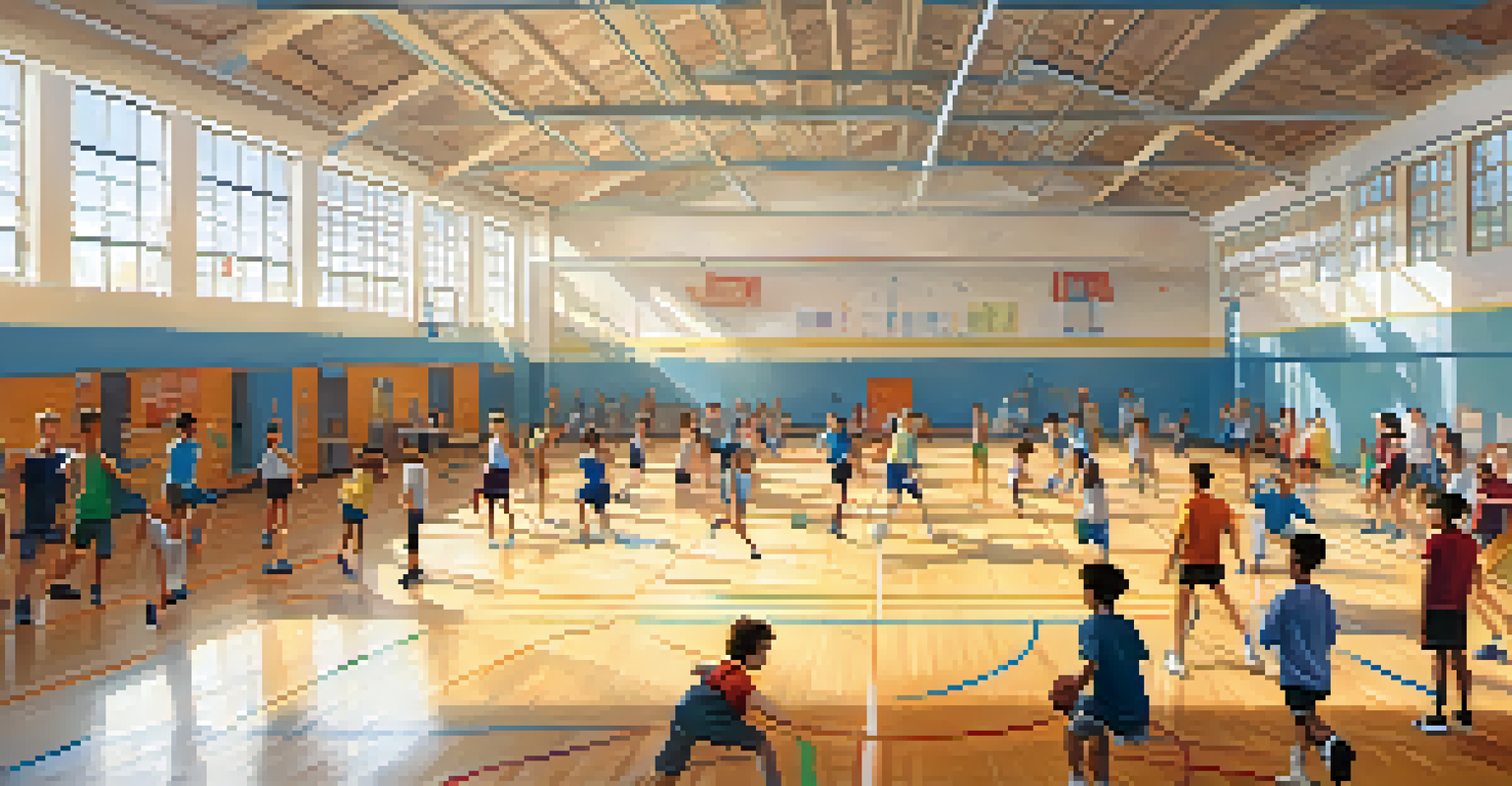The Role of Exercise in Academic Achievement: Key Facts

Understanding the Connection Between Exercise and Learning
Exercise is more than just a way to stay fit; it plays a crucial role in enhancing cognitive function. When we engage in physical activity, our brains receive a boost of oxygen and nutrients, leading to improved focus and memory retention. This connection is especially important for students, as a sharp mind can significantly impact learning outcomes.
Physical exercise is not only one of the most important keys to a healthy body, it is the basis of dynamic and creative intellectual activity.
Research has shown that regular exercise can lead to better academic performance. For instance, students who participate in physical activities tend to score higher on tests and exhibit improved classroom behavior. This relationship underscores the idea that a healthy body contributes to a healthy mind, creating a solid foundation for academic achievement.
Moreover, incorporating exercise into daily routines can help students manage stress and anxiety, which are common barriers to learning. By reducing these negative feelings, students can approach their studies with a clearer mindset, ultimately leading to enhanced performance and a more positive educational experience.
The Science Behind Exercise and Brain Function
At the heart of the exercise-academic achievement connection lies neuroscience. Physical activity stimulates the release of neurotransmitters, such as dopamine and serotonin, which are crucial for mood regulation and cognitive function. These chemicals help create an environment conducive to learning and retention.

Additionally, exercise promotes neurogenesis, the process of generating new brain cells, particularly in the hippocampus—a region essential for memory and learning. This means that regular physical activity not only helps students retain information but may also enhance their overall intelligence over time.
Exercise Boosts Cognitive Function
Engaging in physical activity improves focus and memory retention, which is essential for effective learning.
It's important to note that the type of exercise can matter, too. Activities that elevate heart rates, like running or swimming, are especially effective in boosting brain health. However, even moderate activities like walking or yoga can yield positive results, making it easy for students to incorporate exercise into their daily lives.
The Role of Exercise in Reducing Academic Stress
Academic pressure can lead to significant stress among students, impacting their performance. Exercise serves as a natural stress reliever, providing an outlet for pent-up energy and anxiety. Engaging in physical activity can help students feel more relaxed, enabling them to tackle their studies with a fresh perspective.
Exercise is a celebration of what your body can do. Not a punishment for what you ate.
Furthermore, regular exercise helps improve sleep quality, which is often disrupted by stress. A well-rested mind is better equipped to focus, process information, and retain knowledge. This cycle of exercise, better sleep, and reduced stress creates a positive feedback loop that fosters academic success.
For example, students who participate in team sports often report feeling less stressed during exam periods. The camaraderie and shared experiences help them build resilience, making it easier to cope with academic challenges.
How Physical Education Enhances Academic Rigor
Many schools incorporate physical education (PE) into their curricula, recognizing its importance for overall student development. PE classes not only promote physical fitness but also teach valuable life skills like teamwork, discipline, and time management. These skills can translate into better academic habits.
Moreover, students who engage in regular PE are more likely to develop a routine around their studies. This structure can help them prioritize tasks and manage their time effectively, leading to improved academic performance. It's a win-win situation where fitness and education go hand in hand.
Physical Activity Reduces Stress
Regular exercise acts as a natural stress reliever, helping students approach their studies with a clearer mindset.
In fact, schools that emphasize physical activity often see a more motivated student body. With a focus on health and wellness, students are more likely to engage in their studies and demonstrate higher levels of enthusiasm for learning.
The Impact of Exercise on Memory Retention
Memory retention is a key factor in academic success, and exercise plays a significant role in enhancing this ability. Studies indicate that students who engage in physical activity before studying can improve their recall abilities. This means that a quick workout could be the secret weapon before hitting the books.
One effective method is to incorporate short bursts of exercise during study breaks. This approach not only refreshes the mind but also enhances focus when students return to their materials. For example, a brisk walk or a few minutes of stretching can be just what a student needs to reset their brain.
Additionally, exercises that require coordination and strategy, like dance or martial arts, can further enhance cognitive abilities. By challenging both the body and mind, students can develop stronger memory pathways that aid in learning.
Building Social Connections Through Team Sports
Participating in team sports offers more than just physical benefits; it fosters social connections that can enhance the academic experience. Building friendships through sports can lead to a supportive network, encouraging students to motivate each other academically as well. This camaraderie can create a positive environment that promotes learning.
Moreover, teamwork and communication skills honed in sports often translate to collaborative projects in the classroom. Students who work well with others can approach group assignments with confidence, leading to better outcomes and a more enjoyable learning experience.
Team Sports Foster Academic Support
Participating in team sports builds social connections that encourage academic motivation and collaboration among students.
In essence, the relationships formed through team sports can create a sense of belonging. This emotional support can help students navigate the ups and downs of academic life, contributing to their overall success.
Creating an Exercise Routine for Academic Success
To harness the benefits of exercise for academic achievement, students should aim to create a consistent routine. This doesn’t mean spending hours at the gym; even short sessions of physical activity can be effective. Finding enjoyable activities is key, as this increases the likelihood of sticking to the routine.
For instance, students can mix and match different types of exercise, like cycling, dancing, or even yoga, to keep things exciting. Setting aside dedicated time for these activities helps reinforce the habit and can serve as a refreshing break from studying.

Ultimately, the goal is to create a balance between physical activity and academic responsibilities. By prioritizing both, students can optimize their performance, leading to a fulfilling and successful educational journey.